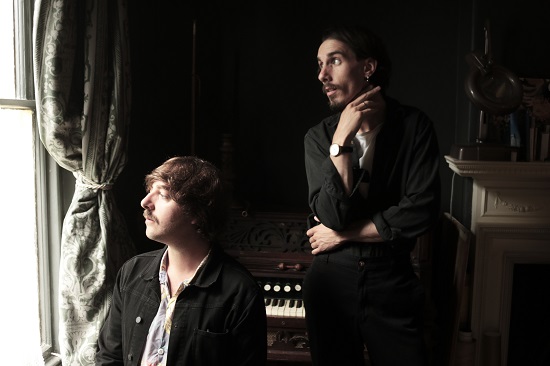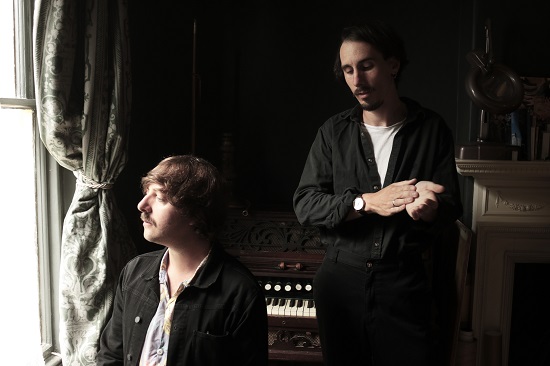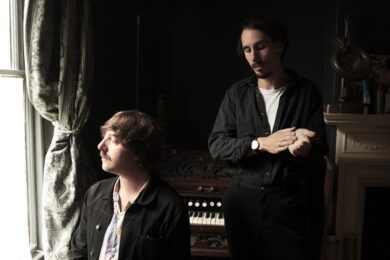Photos by Laura Spark
More or less every night, at least when there isn’t a pandemic, Concert Square in Liverpool is a chaotic and dizzying place. It is the core of the city’s student clubbing scene where duelling sound systems create a throbbing, blaring mud of chart music and singalong properindieforthelads, peppered with the occasional seagull’s squawk, football chant or smashing glass. About two and a half years ago, however, in a flat above Django’s Riff (a bar forever changing hands, its successor Cellar 24 closed last October after the owner called a negative Facebook reviewer a “bad Tory beaut”), music of an altogether different sort was taking place.
“Concert Square is either the beating heart or the throbbing anus of the city, depending on your perspective,” says Andrew PM Hunt, owner of said flat and the leader of vital left-field pop project Outfit, among other acclaimed work. That day, Benjamin D. Duvall, one part of experimental trio Ex-Easter Island Head, had come to visit. He brought along some small battery powered motors introduced to him by Vitalija Glovackyte, one half of Manchester experimental duo Hyperdawn, the same kind that control the vibrations in your phone.
“I’d brought them round to Andy’s flat to be like, ‘Here y’are, have these, they’re quite fun, you can put them on a cymbal or whatever’,” he says. “It was from demonstrating one on an autoharp and tickling the strings that we started responding to one another musically, and before I knew it he’d put a mic up and pressed record. By the time we finished it was ‘Fucking hell, that was good, wasn’t it!’”
Two and a half years on, these recordings are the first thing you hear on the jittery and hypnotic ‘Regulate’, the opening track on their gorgeous debut album as Land Trance, First Seance. After that evening, Duvall kept bringing different bits and pieces from his large collection of equipment and small instruments – a cassette dictaphone, a melodica, whatever he could fit in his backpack – and the pair continued to record. “Not in an especially careful way,” Hunt recalls. “It was a case of slinging a mic up in a room whilst this pulsing sub bass was coming up from the clubs downstairs; we just really had to hope that it wasn’t ruining whatever it was we were doing. Remarkably, we kind of got away with it!”
In fact, Land Trance could not sound further from Concert Square. Often, thanks to these grand and opulent rushes of organ (in fact recorded with a cheap Yamaha), it has a divine or cosmic spirit to it. “I learnt to play music in church so I think there is a kind of ecclesiastical, Catholic sound to some of the organ work,” says Hunt. “There’s something I really enjoy about this almost spiritual sound to it at the same time of us making it above Concert Square; I really appreciated that contrast.”
Land Trance marks the first time the two musicians have recorded with one another, somewhat surprising given that they’ve been friends for fifteen years and have lived together for the majority of the last twelve. After he left his Concert Square flat – recording a cello loop just before he left to make use of the unique acoustics of a packed-up dwelling, the sounds of which would later become the “foundational piece” of First Seance track ‘A Raft’ – Hunt joined Duvall (and fifteen others) in moving into a building that was once the Brazilian Consulate in Liverpool, and where the rest of the record was completed. When I lived in Liverpool Duvall’s band Ex-Easter Island Head and Hunt’s project Outfit were often mentioned within the same breath when people were discussing outliers in the city’s considerable crop of forward-thinking musicians. “Our practises have always been very much adjacent to each other and very physically close,” says Duvall, “but we’d never actually worked together until we started this.”
Their respective discographies are very different, Outfit’s music is a particularly lush blend of electronic pop and Dialect, Hunt’s solo project, is sprawling and kaleidoscopic, while Ex-Easter Island Head are a process-driven project fixated on pushing the boundaries of their craft. Nevertheless, it’s a marvel they haven’t collaborated before. Hunt puts it down to “a combination of crushing jealousy and begrudging respect. I was always jealous of Ben’s music; how conceptually neat it all was. I always felt like it had quite a lot of integrity, something that my music never had.”
Duvall returns the favour. “I see it mainly in terms of ego, not in terms of ‘I won’t lower myself to work with this man!’ but the opposite. Through living together over such long periods of time, frequently I’ve used Andy as a bit of a benchmark. A feeling of ‘Oh shit, I need to be doing more here’ when I can hear him in his room cranking out tunes. You can get quite jealous of him! But then entering your 30s,” he continues (he is 34, and Hunt is 32), “It becomes quite well defined what each of us does in relation to the other. I think we needed to mature to be secure enough in our own voices before we could collaborate.”
One of the biggest reasons Land Trance is such a successful project is the cohesion Duvall and Hunt have established when combining their two voices; you can hear the former’s psychedelic instincts being pushed further outside of the box by the latter’s driving spirit and his innovative approach to instrumentation. “I think what’s been interesting for me about this is that on all the Ex-Easter Island Head records there’s been a minimum of overdubs, they’ve basically been absolute documentaries of what you’re going to get when you see Ex-Easter Island Head live, it’s all very structured and the records have always aimed for realism, whereas with Land Trance we’ll record something and Andy will pitch it up an octave or down an octave, or we’ll take a really small sound, a tiny motor tickling a handful of unamplified string, and we’ll blow it up and make it hyper-real or fantastical in its scale.”

One of the advantages of Land Trance’s music, Duvall says, is the fact that (for now at least) they don’t have to worry about recreating it live. “You don’t have to worry about [things like] ‘We’re using a bamboo marimba on one track for 50 seconds, is that coming on tour with us?’” As a result, they say, there was a sense of liberation when it came to just how many bells and whistles (literally) they could attach to the music. “I’m a bit of an accruer of sound things,” Duvall continues, “picking stuff up from charity shops, and frequently you’ll get something and not do anything with it for a few years, but you know it’s going to be just right at some point. It just felt right to dig out all those odds and ends from the odds and ends box, and then fortunately there’s such a wealth of little things.”
That inviting, hospitable aspect to Land Trance’s music extended beyond their menagerie of instrumentation. “It became a container we could pour our shared history into, and these various memories we share,” says Hunt. “All of the tracks have got some sort of key ingredient that is on some level resonant for either one of us or both of us.” As a result there is a potent core of emotional resonance to First Seance that keeps bubbling to the surface in a myriad of different forms; in the cello loop Hunt recorded as he left Concert Square that captures that strange and unique pang of leaving a home for the last time, for example, or the tentative ambition of those first sessions with the motors they captured on ‘Regulate’, or those rushes of organ, so redolent of Hunt’s Catholic upbringing.
The track ‘Transcript’ makes use of a tape loop Duvall recorded when he was at university that had sat decaying for years. “Not to rip off William Basinksi here but it has a kind of potency because of how long you left it,” he says. ‘Beach Mystery’, meanwhile, is based around a cassette recording made eleven years ago on Formby Beach, “just me walking around with some mates, with lots of wind overloading the microphone.”
Freed from the constraints of translating their soundscapes to a live setting, a process emerged from the pair’s improvisations. “We’ll start with one sound and then it sparks some sort of, often shared, reference for the two of us that will lead us on to searching for a complementary sound. When we’re doing stuff in the studio it’s probably quite pretentious to listen into, but we’re saying stuff like ‘I can hear such-and-such, so now I want to hear this’,” says Hunt.
Duvall takes ‘Beach Mystery’ as an example. Using that recording of Formby Beach “we’d think ‘Let’s use that as the basis for something.’ The recording obviously suggests ‘beach’ and ‘coast’, and you’ve got the sound of the waves on there, so we’ve got a music box on it, and the way we treated it sounded like wooden objects lapping in the waves, or maybe even donkey’s hooves…” To take another example, that aforementioned organ sound that gives First Seance it’s sublime qualities, “the chain of association might be burning incense, it might be ‘bells’, it might be ‘silence’, it might be ‘books’. Associating an organ sound with incense we might then try and create a reverb effect that gives the impression of burning incense. It’s not like we sit down and say ‘OK, we’re in a church, here’s how it’s gonna go’, but it’s a chain of association.”
There are times when this process becomes not only incredibly enjoyable to hear, but deeply moving too, none more so than on ‘Chilean Miners’, what Duvall calls the record’s “emotional heart”. The jumping off point here was a cut-up recording of a news interpreter, translating the words of one of the 33 men freed after 69 days underground following the infamous Copiapó mining accident in 2010. ’I want to say to you / we are very proud of you’ you hear him say in fragments atop a rich and moving drone interspersed with leaping notes of ocarina, his voice quivering just slightly with emotion inherited from the man he’s translating as he addresses ‘those still underneath.’
Hunt and Duvall used that gently extraordinary recording as their jumping off point for that track, using rushing ocarinas and a “kind of bubbling sound” achieved with a digital dictaphone that they wanted to sound like birds flying away when the translator addresses those still trapped. But on this track more than any other there was a raw and potent emotional root they drew upon too. “On the night that the last miner was rescued from the mine it was this touch and go situation and it was all over the news,” Duvall explains, “but it was a very painful evening for us because one of our mutual friends took his own life. We got that news on the night that this last miner came out of the mine. After hours and hours of staying up grieving you get to the point where you’re just completely spent and in shock, you put the telly on just for a change of something and the news there was of the guy coming up from the mine and this translator was making a very impassioned address. That kind of stuck with me, the juxtaposition of the absolute tragedy of losing our friend and the hopefulness of that message, ‘For those who are still underneath, we’re gonna bring them out soon.’ It had this emotional pull to it, and also because of the tone of the guy’s voice, you can hear the emotion but it’s got this strange remove because you can hear that the translator is very emotional as well. It’s just vibrating with latent emotional power. We thought we should use that, as a fitting remembrance of our friend.”
It is the most powerful and gripping moment on First Seance, but there are plenty of others where Land Trance achieve something truly sublime. There are trappings that come with the type of music they make, but what they do is so deeply personal that, combined with their straight-up compositional ability, it allows Land Trance to eschew them. “We’re doing something that’s trancey and hypnotic, and I think a lot of people, certainly over the last decade with a lot of people getting into spiritual jazz, there can often be a fair bit of cod-mysticism thrown onto what is basically just repetitive ambient music,” says Duvall. Rather, Land Trance’s music finds a more personal kind of transcendence in the way it takes its two members’ respective histories and respective creative powers, intertwines them and amplifies them to create music that shimmers and glistens on its surface, and judders and resonates at its core.
First Seance is out now



